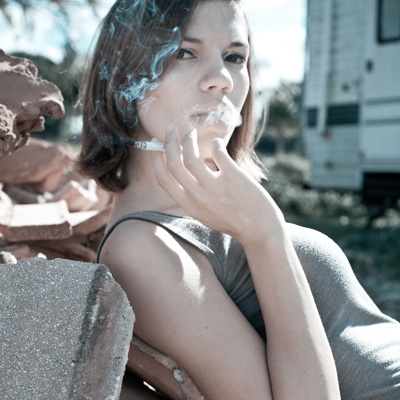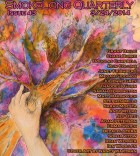In “True, False and Floating,” the main character feels mostly developed through his or her interactions with different Russian landmarks. In general, how intertwined is setting and character for you as a writer? And is there one that usually comes first in your process: an idea for where a story should be or an idea about a character?
Many of my stories come from a first sentence or a title, even if I have no clear idea at the time where I’m going to take it. That’s always my cue to pour the coffee, put some blues on the stereo, and follow the trail: and I love that feeling. I had this title first, and as soon as I stood in front of the giant’s skeleton in St. Petersburg, my fingers counting my own ribs, I knew I’d found my story. So I tend to find the words to trigger an idea, then the place where it belongs, but characters can take a little more time to coax into being. Matching them together takes patience, but when they fit, I know it.
On your web site, you talk about traveling to research things for your stories. Can you discuss your travel plus research process?
My professional background is linguistics—I’m endlessly fascinated by weird and wonderful languages and dialects—so travel is a real passion. Sometimes the research comes first, and a place bewitches me so much I have to visit. There’s a Finnish cowboy scene? Hand me my passport! A town in Mississippi is called Panther Burn? Get in the car! I don’t mean to imply that I can take off whenever I want—far from it!—but when I do, my eye is pretty sharp for kernels of quirk that I can shape into story form, and I tend to build my itinerary according to my research.
However, sometimes it works the other way around and the spells are cast after I return, and can’t get a place out of my mind. I found Russia so enthralling that I knew it would need a story of its own: in “True, False and Floating” all the details are accurate, from the reindeer salami at the airport, to the Church on Spilled Blood and feral squirrels. I was utterly entranced by the language, the toughness of the people and the literary history…it made such an impression on me that my pen just kept moving.
It may be worth mentioning also that I tend to head for the snowy northern places—as an Australian, that’s truly exotic to me. However, the climate can sometimes lead to isolation and introspection, and I do see this reflected in my characters: their struggle for intimacy, or even their struggle against it, as in this story, is a constant theme for me.
I’ve just been accepted for a writing residency in a remote fishing village in the north of Iceland, so it’ll be the perfect opportunity to explore this. I’m so excited I keep pinching myself: now that place knows how to cast spells.
One of the things I found most striking about “True, False, and Floating,” is the story’s confidence in showing what’s emotionally at stake without utilizing flashbacks to show the two primary characters in happier times. For me, it was done through how lived-in the dialogue felt. What techniques did you use to make these two voices feel so distinct?
Thank you—I’m slowly gaining confidence with dialogue, so I appreciate that! As readers we’re all spies, really, as though we’re sitting on a chair in the corner, watching the scene play out. I wanted to focus on the immediacy of that phone call, to balance her dread of the conversation to come with his utter ignorance of it. The sense of secrecy seemed to meld with the vaguely menacing setting of St. Petersburg and lend another element to their interaction. Whether there had been, in fact, happier times or not is left up to the reader.
For you, what’s the appeal of writing flash fiction?
Part of the joy of writing flash for me is getting in, telling the story, and knowing when to get the hell out. You have to be sure of the value of every single word, and that’s been quite an education. I’m now working on longer stories, as well as a novel, but I’ll always look at flash fiction as having taught me to find my voice, and to be brutal with the red pen.
I also love the abundance of skins I can crawl into with characters. For one thousand words I can be a ventriloquist in the 1920s, a teenager in the central desert of Australia, or a gruff old taxidermist. The freedom to experiment with tense, point of view and style is likewise exciting, but I get to play different roles with each story, and that delights me every time. Well, except for the ventriloquist…that one managed to creep me out, I have to say. When I finished that story and pulled the vintage circus photos down from above my writing desk, even the cat thanked me.


